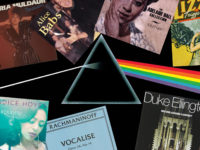To take the old-school harmonic brilliance of Duke Ellington into the realm of John Coltane — soon to establish himself as the picture of avant garde, stimulatingly free, out there in such a way as to legitimately draw comparisons with the spiritual — was, you imagine, a challenge of equal measure for both.
Coltrane’s core band is joined by Ellington and his bassist and drummer on this September 1962 date. Together, they reimagine six Duke-related numbers (one is by longtime Ellington collaborator Billy Strayhorn) as well as another tune by the younger horn player.
The result is, more often than not, a modernistic update in keeping with the vernacular of Coltrane’s home label at the time, Impulse. But it’s clear from the beginning — a beautiful, meditative turn on “In a Sentimental Mood” — that there is a warm admiration from Trane for this elder statesman of the American music form, as well.
“Duke Ellington and John Coltrane” is, then, the best of both worlds, an intriguing example of the adaptive genius of one and the emerging genius of the other.
Ellington’s impish original “Take the Coltrane” (with drummer Elvin Jones and bassist Jimmy Garrison) is followed by Coltrane’s only composition — “Big Nick,” a soprano feature dedicated to Nick Nicholas, a former bandmate in the old Dizzy Gillespie ensemble. Duke’s almost off-hand aptitude in the small-band setting has rarely been better spotlighted than during the airy, then staccato solo found here.
Duke’s regular bassist Aaron Bell and drummer Sam Woodyard are featured on the next two numbers, a swinging blues called “Stevie” and then on Strayhorn’s “My Little Brown Book,” which includes a simmering solo reminiscent of that great Ellington sideman Johnny Hodges.
The recording’s highpoint (after the initial cut, of course) follows, as the Ellington composition “Angelica” is redefined by stirring turns from both Coltrane and Duke, each sounding atmospheric and assured — again with the able backing of Jones and Garrison). Finally, there is the rollicking then-new original “The Feeling of Jazz.”
Of course, that feeling (with Coltrane well out in front) would change, and rapidly, over the balance of the 1960s. You can’t help but wonder how much the elder composer’s unique sense of alliteration and counterpoint influenced the muscular advancements in Trane’s sound over the next few years.
This record (reissued in February of 2008) is the answer, a road map to both Ellington’s lingering importance despite jazz’s decisive turn away from the more conventional large-group dynamic, but also an interesting peek into the infrastructure of Coltrane’s still-coalescing new sound.
- Nick DeRiso’s Best of 2015 (Rock + Pop): Death Cab for Cutie, Joe Jackson, Toto + Others - January 18, 2016
- Nick DeRiso’s Best of 2015 (Blues, Jazz + R&B): Boz Scaggs, Gavin Harrison, Alabama Shakes - January 10, 2016
- Nick DeRiso’s Best of 2015 (Reissues + Live): John Oates, Led Zeppelin, Yes, Faces + others - January 7, 2016



